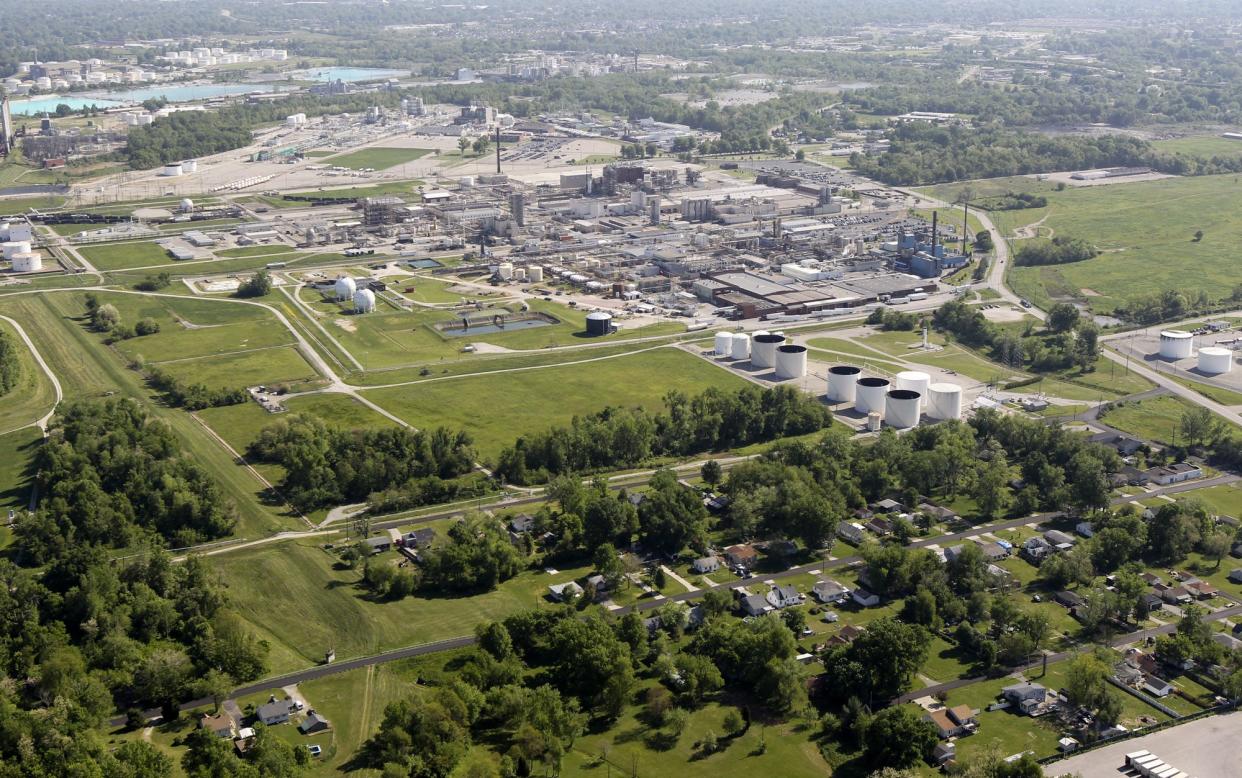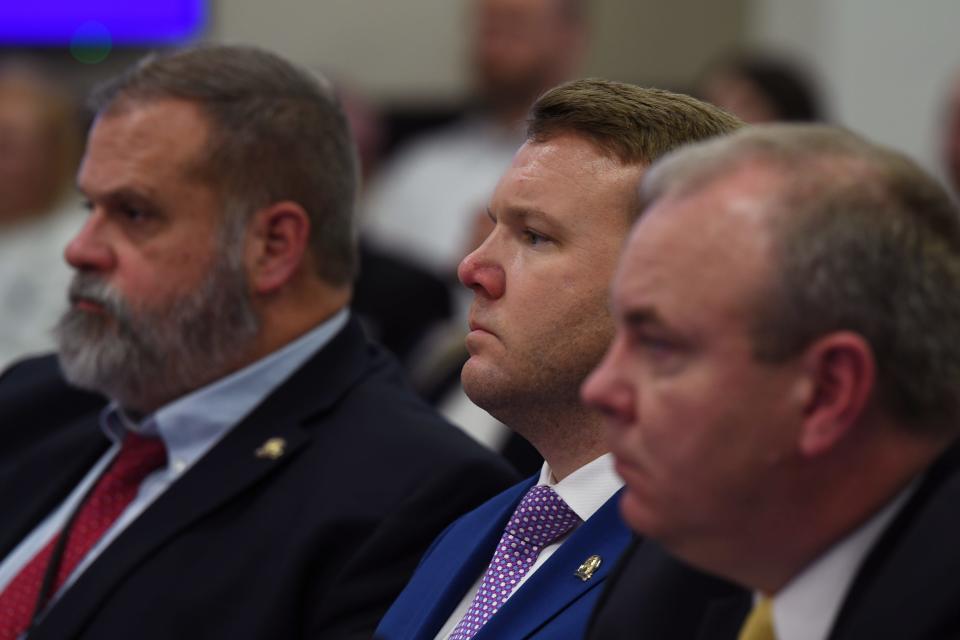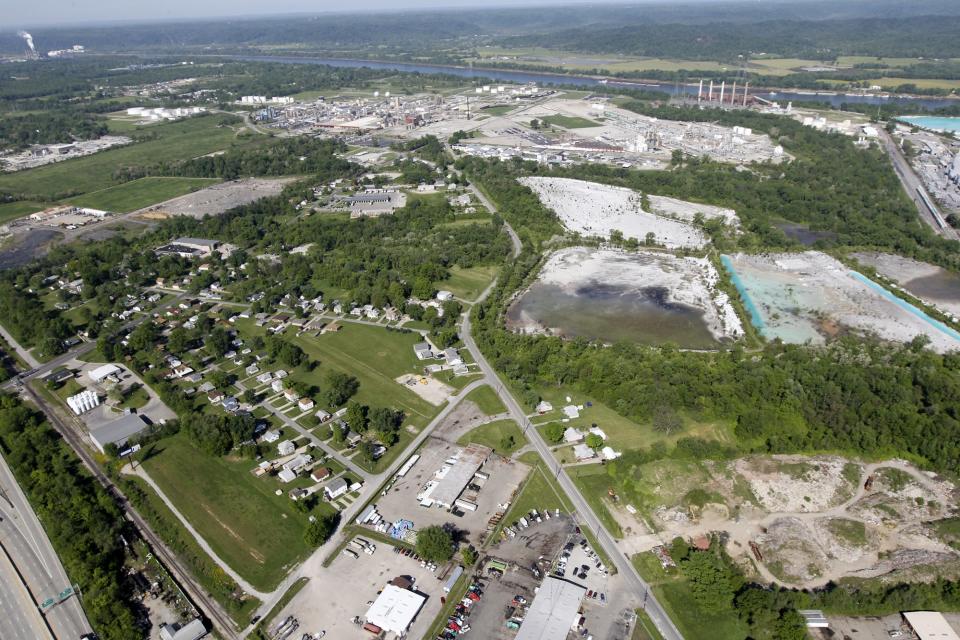Bill to limit Louisville pollution enforcement pushed by lawmaker from Rubbertown plant

Kentucky senators will soon consider legislation limiting the authority of Louisville's Air Pollution Control District to seek penalties against polluters in some cases, following the bill's January approval in the House.
Under House Bill 136, sponsored by Rep. Jared Bauman, R-Louisville, companies that conduct an internal audit of their operations, discover a violation of local air pollution rules and voluntarily report that violation to officials would be protected from penalties, with some limitations.
These provisions, called "environmental audit" and "voluntary disclosure" privileges, are currently active in 119 Kentucky counties. The proposed bill would extend them to Jefferson County — the only place in Kentucky where an air pollution control district actively regulates air quality and emissions, rather than the state.
Bauman and other proponents said the bill would encourage Louisville companies to conduct these audits, come forward and fix any issues promptly, without fear of fines from the city.
But Bauman's employment in the chemical industry has brought criticisms of the legislation, which was drawn up without input from APCD or the predominantly Black and low-income communities closest to Louisville's chemical plants.
Those fenceline communities, in a decades-long fight to reduce their exposure to hazardous pollution, have attended countless meetings of the district, demanding regulators do more to hold the chemical industry accountable.
Instead, critics say Bauman's bill would further tie regulators' hands.
'Our issues have been ignored'
In the House, Bauman's bill passed 80-12 with minimal debate. All opposing votes were cast by Democrats, including those representing Louisville's West End.
"This bill rewards bad behavior," said Rep. Chad Aull, D-Lexington, in opposition to the legislation, "and it puts one of our largest communities' health at risk."
Violations found by regulators, not reported by companies, would still bring penalties. Companies also would not be protected from penalties in cases of "imminent discovery of the violation by a regulatory agency," according to the bill.
And at least a few Democrats supported the bill, including Rachel Roarx, D-Louisville. She proposed an amendment, approved by the House, to ensure APCD could still levy penalties against companies with a pattern of violations, calling it a compromise with Bauman's original proposal.
In its 2024 state legislative agenda, Greater Louisville Inc. called for extending environmental audit privilege to Louisville. And Rusty Cress, on behalf of the Kentucky Association of Manufacturers, spoke in support of the bill in a House committee meeting, saying it "merely creates a consistency between the other 119 counties, EPA and Jefferson County."
An APCD spokesperson confirmed the district was not involved in drafting the bill, and first saw the proposed language when it was filed publicly.
Asked on the House floor whether he had met with "any interest groups or people that would be affected directly by this bill," Bauman said he had not.
"That makes you a bad legislator," said Donovan Taylor, an advocate and resident of the Chickasaw neighborhood, in an interview. He added Louisville's fenceline communities have "long felt that our cries for help and concerns for our issues have been ignored."
Bauman, who is also sponsoring the controversial "Safer Kentucky Act," did not respond to The Courier Journal's requests for comment.
A previous version of the state environmental audit rules Bauman is proposing to extend to Louisville were subject to a letter of deficiency from the U.S. Environmental Protection Agency in 2000. At the time, the agency said the state statute "unduly restricts Kentucky’s ability to adequately administer and enforce" federal clean air requirements.
The Kentucky Resources Council said amendments the state made in 2001, following the EPA's notice, "narrowly addressed" the issues. Following the filing of Bauman's bill, the nonprofit sent a letter to the EPA, requesting a new review of the state law and a formal opinion of its compliance with the requirements of the Clean Air Act.
And in committee last month, KRC lobbyist and associate attorney Audrey Ernstberger told lawmakers expanding these rules to Louisville could renew EPA scrutiny of Kentucky's Clean Air Act implementation.
Conflict of interest concerns

During a January House committee hearing on HB 136, Rep. Beverly Chester-Burton, D-Shively, who represents the communities closest to Louisville's Rubbertown industrial corridor, asked Bauman whether he, or a company he works for, would benefit from his proposed legislation.
In response, Bauman said, "I do work in industry in Louisville," adding the Kentucky Legislative Ethics Commission had cleared his bill as compliant with the ethics policy. He declined to name his employer when asked, saying, "I don't think that's relevant."
Bauman works for Lubrizol, which operates a chemical plant in Louisville's Rubbertown corridor regulated by the Louisville Air Pollution Control District. Lubrizol confirmed his employment at the company's Louisville facility.
"The decisions Rep. Bauman makes to sponsor or support proposed legislation are his alone," a company spokesperson said in a statement. "Jared does not seek Lubrizol’s input or discuss proposed legislation with anyone at Lubrizol. We respect Jared’s commitment to his community and his independence in deciding what proposed legislation to sponsor and/or support."
Lubrizol's plant in Rubbertown, in compliance with its permits, released more than 33,000 pounds of toxic chemicals into the air between 2013-22, according to a U.S. Environmental Protection Agency inventory. The releases included hydrochloric acid and vinyl chloride, a carcinogen.
The facility has not been cited in recent years by the Air Pollution Control District, according to the district's enforcement dashboard. The company paid $123,450 in fines between 2003-14, The Courier Journal reported previously.
Since Bauman's bill would apply to regulated companies overall, and not specifically to Lubrizol, his involvement appears to be in line with the Kentucky Code of Legislative Ethics, and past opinions of the ethics commission.
Here is a relevant section of the code, KRS 6.761, which covers conflict of interest provisions in the legislature:
"...A legislator may participate in the discussion of the question in committee and on the floor of the General Assembly, vote, or make a decision on a matter if any benefit or detriment which accrues to the member of the General Assembly, as a member of a business, profession, occupation, or other group ... is of no greater extent than the benefit or detriment which accrues generally to other members of the business, profession, occupation, or other group..."
In legacy of air pollution, Louisville stands apart

Proponents of the environmental audit legislation portrayed the changes as a means of aligning regulation in Jefferson County with the rest of the state.
But the area's industrial presence, along with bleak health equity data out of the city's West End, helps explain why Louisville stands apart.
Jefferson County has the highest concentration of air-polluting facilities in the state, all set amid the residential neighborhoods of Kentucky's largest city.
APCD dates back more than 70 years, when air pollution was measured in buckets hanging from lampposts, and today employs 50 people. These include engineers, chemists, data specialists and compliance officers to regulate Louisville's wide range of industrial operations — a "pretty large undertaking," said Byron Gary, a program attorney for Kentucky Resources Council who previously worked for the district.
Penalties from enforcement action help fund the district's regulatory work. And some of the district's most notable progress in reducing toxic air emissions has come from regulating beyond the state's requirements, including the 2005 STAR program, which took significant steps against air toxics following sustained community advocacy on the issue.
A vast majority of people living closest to Rubbertown are Black, low-income or both, according to federal data. A recent health equity analysis released by city officials showed a deepening disparity in West End life expectancy, with Black residents bearing the most significant burden.
The residential neighborhoods closest to the Rubbertown area have estimated rates of heart disease in the 97th percentile and asthma rates in the 99th percentile nationally, among many other health factors.
The proposed legislation "will not only result in a loss of local ability to hold hazardous facilities accountable, but could lead to our increased exposure to hazardous chemicals," the grassroots Rubbertown Emergency ACTion group said in a recent call to action for residents to contact their state legislators.
The Rubbertown corridor is also seeing a push for independent air monitoring through grassroots groups, and proposed EPA requirements could soon require additional fenceline monitoring.
Since most toxic emissions data has historically been self-reported by facilities, the industry could be pushing for legislation to protect itself from potential violations unveiled by future air monitoring efforts, said Monica Unseld, a local public health expert, advocate and founder of Until Justice Data Partners.
"They're behaving like people who have something to hide," Unseld said, "because they do."
Connor Giffin is an environmental reporter for The Courier Journal and a corps member with Report for America, a national service program that places journalists in local newsrooms to report on under-covered issues. The program funds up to half of corps members’ salaries, but requires a portion also be raised through local community fundraising. To support local environmental reporting in Kentucky, tax-deductible donations can be made at courier-journal.com/RFA.
Learn more about RFA at reportforamerica.org. Reach Connor directly at cgiffin@gannett.com or on X @byconnorgiffin.
This article originally appeared on Louisville Courier Journal: Lawmaker in chemical industry pushes bill to limit pollution penalties

